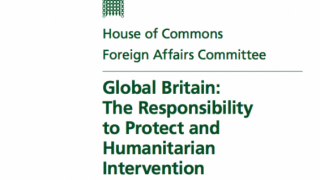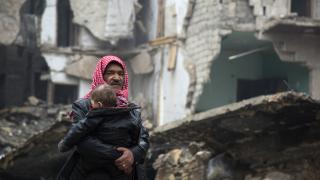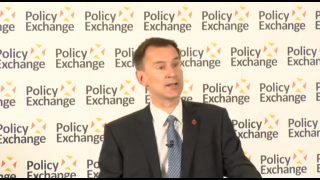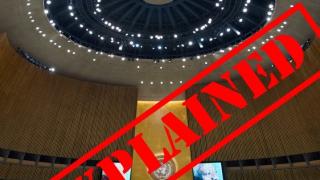
The UK government released its response to the Foreign Affairs Select Committee (FAC) report on the Responsibility to Protect and Humanitarian Intervention. The report called for the UK to establish a cross-government atrocity prevention strategy - something UNA-UK has requested for some time.
UNA-UK is deeply disappointed to see the UK government reject the Inquiry’s core recommendation that the Government should adopt a new atrocity prevention strategy. In its response, the Government stated that atrocity prevention work is currently undertaken as part of the Government's conflict prevention agenda and that the Government's work on preventing atrocities is already established within existing geographical and thematic workstreams.
UNA-UK has long argued that this approach to preventing atrocities is insufficient. While most atrocities occur within conflict settings, and while conflict prevention and atrocity prevention approaches are often compatible, atrocity crimes are not an inevitable feature of conflict. They can and do occur outside conflict situations, and they can and do have an impact on the dynamics and trajectory of conflicts.
Subsuming atrocity prevention into conflict prevention work risks overlooking the distinct nature and consequences of these crimes, and impeding conflict prevention objectives. It also ignores the many instances in which the two approaches diverge. Numerous experts and practitioners have pointed to situations in which the objectives of atrocity and conflict prevention have been diametrically opposed.
For example, tasking UN peacekeepers with protecting civilians from atrocities can sit uneasily within a more traditional peace operations mandate which sees peacekeeping as a tool for de-escalating conflict. The UN’s actions in, for example, actively combatting the M23 militia for control of areas around Goma in the Democratic Republic of Congo in 2013, or using force to turn around an armed group threatening the town of Bambari in the Central African Republic in 2016, are highly likely to have exacerbated those conflicts, but many would argue that these actions prevented atrocities and saved civilian lives.
The case of Bosnia offers a strong historical example where it has been argued that international actors privileged conflict resolution over atrocity prevention with negative consequences. For instance, when an arms embargo was applied to both perpetrators and victims of atrocities (a legitimate conflict prevention strategy) it inhibited the victims’ capacity to protect themselves.
This does not mean that UNA-UK advocates an atrocity prevention approach over a conflict prevention approach in every circumstance. Instead, we make the case that both must be taken into account, and an evidenced-based decision made as to the course of action most able to protect civilians from harm. This, of course, requires having adequate strategies and policies in place to make such assessments, and to put them into practice. As such, UNA-UK has long called for a cross-government atrocity prevention mechanism in the form of a “Joint Unit” to enhance the UK’s work on this.
In its response to the FAC report, the Government claimed that an atrocity prevention strategy may not improve delivery and that it could take resources away from existing work. This indicates that there is a lack of understanding as to how a more coherent approach could save resources and lead to better outcomes.
The Government also set out concerns that an atrocity prevention strategy could lead to duplication of efforts. However, the Government has recognised the value of cross-Government strategies for issues such as countering extremism and modern slavery, and has also set up joint units for issues such as peacekeeping and counter proliferation. The National Security Strategy and Strategic Defence and Security Review (NSS/SDSR) states that joint units “remove duplication, consolidate national security expertise and make the most efficient use of it across government.” Outside the UK, the US’s Atrocity Prevention Board provides a revenue neutral example of how a permanent member of the Security Council has sought to bring more coherence and consistency to their policy in this area.
The current lack of a cross-Government mechanism has given rise to criticism that the UK’s actions have been inconsistent, and sometimes incompatible, with the UK's international commitments to the rules based global system. As we argued in our evidence
"The UK’s response has been selective as a consequence of a range of factors including politics, media coverage and competing agendas. This means that in situations – such as with respect to Myanmar – the UK’s response has been insufficient, and in yet other situations – such as in Yemen – the UK finds itself complicit through its political and material support to the perpetrators of atrocities.
"This is particularly regrettable in light of the fact that the UK has “penholder” responsibility for drafting Security Council resolutions in both cases… Time and again it appears that that the UK pursues the prevention of atrocities opportunistically when it aligns with strategic objectives but that atrocity prevention is not itself a strategic objective.”
This inconsistency has also given rise to concerns that there is a ‘hierarchy of atrocities’ when it comes to UK policy. For example, in Syria, the UK has responded militarily to chemical weapons attacks but not to other grave breaches of international humanitarian law, which have caused many more deaths and injuries. Further while there have been 85 confirmed chemical weapons attacks in Syria since the start of the conflict, including 11 in 2017, the UK only responded in two incidents. By responding to some breaches of IHL over others, the UK risks undermining the international norms that it has championed over the years.
The UK’s response to the inquiry’s report is particularly concerning given the UK Foreign Secretary Jeremy Hunt only recently pledged his commitment to further support the UK’s atrocity prevention work.
UNA-UK looks forward to hearing what the Foreign Secretary's announcement to “do more within our budget on atrocity prevention” looks like in practice given the department’s reluctance to develop a strategy for doing so. However, we remain convinced by the persuasive case made by the FAC on the need for an atrocity prevention strategy, and very much hope that this recommendation will be given further serious consideration by the Government.






